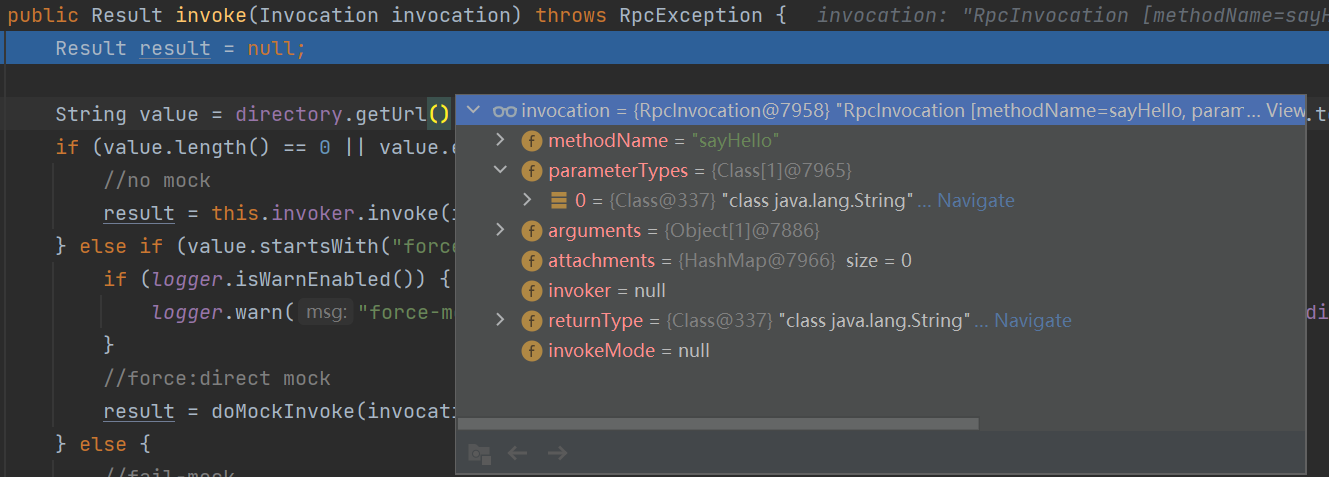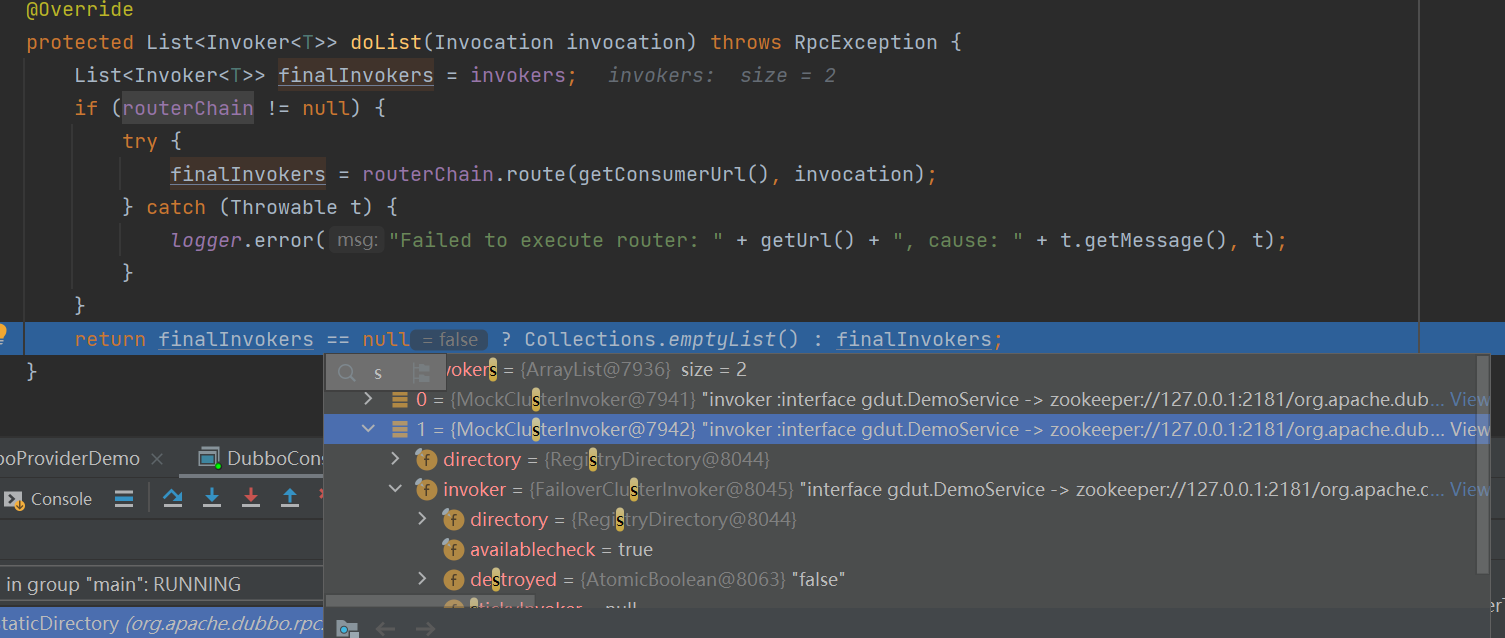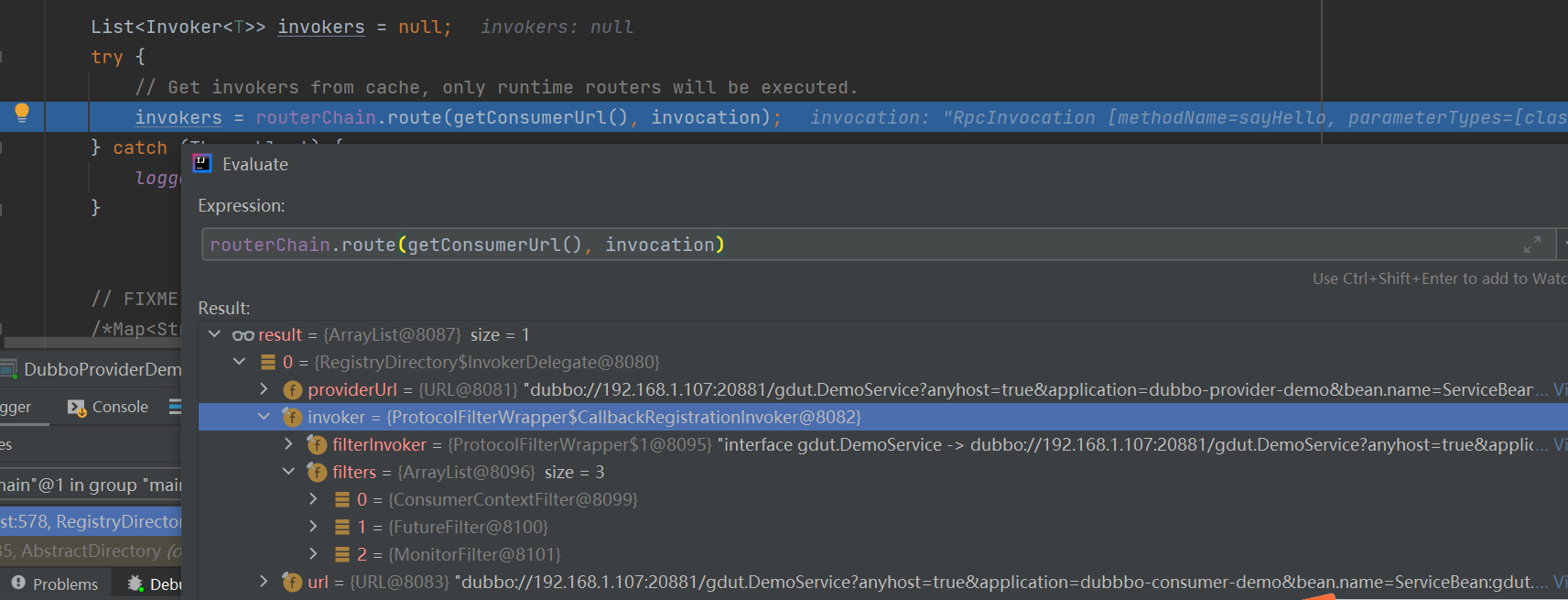RPC call: the client serializes and transmits the service call interface, method name, method type parameters and method parameter values to the server, and the server reads the information in reverse sequence for proxy call.
Summary:
(1) When the client starts, it will pull and subscribe to the corresponding service list from the registry, and the Cluster will synthesize the pulled service list into an Invoker.
(2)Directory#list obtains the providers address (the generated Invoker) for routing and load balancing.
(3) Each interface corresponds to a RegistryDirectory, which is responsible for pulling and subscribing service providers, dynamic configuration and routing.
Consumer initiated call
InvokerInvocationHandler#invoke
After passing through the proxy, the consumer will first call InvokerInvocationHandler#invoke. An RpcInvocation is constructed based on the method name and input parameters. The invoker type here is MockClusterInvoker.
@Override
public Object invoke(Object proxy, Method method, Object[] args) throws Throwable {
String methodName = method.getName();
Class<?>[] parameterTypes = method.getParameterTypes();
//Omit code
return invoker.invoke(new RpcInvocation(method, args)).recreate();
}

MockClusterInvoker – packaging – > failoverclusterinvoker (registryawareclusterinvoker in case of multiple registries) – inheritance – > abstractclusterinvoker

MockClusterInvoker#invoke
Judge whether there is a mock parameter. If not, it defaults to false. The invoker here is the packaged failovercluster invoker.
If mock=false, call FailoverClusterInvoker#invoke (call the invoke method of the parent class AbstractClusterInvoker).
If mock=force, call MockClusterInvoker#doMockInvoke.
If mock=fail, call FailoverClusterInvoker#invoke. If an exception occurs, call MockClusterInvoker#doMockInvoke again.
@Override
public Result invoke(Invocation invocation) throws RpcException {
Result result = null;
String value = directory.getUrl().getMethodParameter(invocation.getMethodName(), MOCK_KEY, Boolean.FALSE.toString()).trim();
if (value.length() == 0 || value.equalsIgnoreCase("false")) {
//no mock
result = this.invoker.invoke(invocation);
} else if (value.startsWith("force")) {
//force:direct mock
result = doMockInvoke(invocation, null);
} else {
//fail-mock
try {
result = this.invoker.invoke(invocation);
} catch (RpcException e) {
//Omit code
result = doMockInvoke(invocation, e);
}
}
return result;
}
Invocation encapsulates the calling method name, parameter type, parameter value and return type.

AbstractClusterInvoker#invoke
First obtain the list of service providers and load balancing policy, and then initiate the remote call.
public Result invoke(final Invocation invocation) throws RpcException {
checkWhetherDestroyed();
// binding attachments into invocation.
Map<String, String> contextAttachments = RpcContext.getContext().getAttachments();
if (contextAttachments != null && contextAttachments.size() != 0) {
((RpcInvocation) invocation).addAttachments(contextAttachments);
}
List<Invoker<T>> invokers = list(invocation);
LoadBalance loadbalance = initLoadBalance(invokers, invocation);
RpcUtils.attachInvocationIdIfAsync(getUrl(), invocation);
return doInvoke(invocation, invokers, loadbalance);
}
(1)StaticDirectory#doList
Get registered invoker.
AbstractClusterInvoker#list–>AbstractDirectory#list–>StaticDirectory#doList
Two MockerClusterInvoker objects were obtained by calling StaticDirectory#doList. Here, the directory of invokers is RegistryDirectory.

(2)AbstractClusterInvoker#initLoadBalance
Get the load balancing algorithm.
Judge whether the first registered invoker has the loadbalance parameter. If not, the default value is random.
RandomLoadBalance random call
Roundrobin loadbalance polling call
ConsistentHashLoadBalance consistency Hash call
Least active calls to leadactiveloadbalance
protected LoadBalance initLoadBalance(List<Invoker<T>> invokers, Invocation invocation) {
if (CollectionUtils.isNotEmpty(invokers)) {
return ExtensionLoader.getExtensionLoader(LoadBalance.class).getExtension(invokers.get(0).getUrl()
.getMethodParameter(RpcUtils.getMethodName(invocation), LOADBALANCE_KEY, DEFAULT_LOADBALANCE));
} else {
return ExtensionLoader.getExtensionLoader(LoadBalance.class).getExtension(DEFAULT_LOADBALANCE);
}
}

FailoverClusterInvoker#doInvoke
MockClusterInvoker#invoke–>AbstractClusterInvoker#invoke–>FailoverClusterInvoker#doInvoke
Gets the number of retries of a method. The default is 2. If the number of retries is not set, a method can be called up to 3 times and retried 2 times. Load balancing selects a invoker and then calls the invoker invoke method.
FailoverClusterInvoker#doInvoke
–>InvokerWrapper#invoke
–>ProtocolFilterWrapper$CallbackRegistrationInvoker#invoke
– > protocolfilterwrapper $1 #invoke (invoker constructed by protocolfilterwrapper #buildinvokerchain)
–>ConsumerContextFilter#invoke
–>FutureFilter#invoke
–>MonitorFilter#invoke
–>ListenerInvokerWrapper#invoke
–>AsyncToSyncInvoker#invoke
– > abstractinvoker #invoke determines whether the method call is synchronous or asynchronous
–>DubboInvoker#doInvoke
–>ReferenceCountExchangeClient#request
–>HeaderExchangeClient#request
–>HeaderExchangeChannel#request
–>AbstractPeer#send
–>AbstractClient#send
–>NettyChannel#send
public Result doInvoke(Invocation invocation, final List<Invoker<T>> invokers, LoadBalance loadbalance) throws RpcException {
List<Invoker<T>> copyInvokers = invokers;
checkInvokers(copyInvokers, invocation);
String methodName = RpcUtils.getMethodName(invocation);
int len = getUrl().getMethodParameter(methodName, RETRIES_KEY, DEFAULT_RETRIES) + 1;
if (len <= 0) {
len = 1;
}
// retry loop.
RpcException le = null; // last exception.
List<Invoker<T>> invoked = new ArrayList<Invoker<T>>(copyInvokers.size()); // invoked invokers.
Set<String> providers = new HashSet<String>(len);
for (int i = 0; i < len; i++) {
//Reselect before retry to avoid a change of candidate `invokers`.
//NOTE: if `invokers` changed, then `invoked` also lose accuracy.
if (i > 0) {
checkWhetherDestroyed();
copyInvokers = list(invocation);
// check again
checkInvokers(copyInvokers, invocation);
}
Invoker<T> invoker = select(loadbalance, invocation, copyInvokers, invoked);
invoked.add(invoker);
RpcContext.getContext().setInvokers((List) invoked);
try {
Result result = invoker.invoke(invocation);
if (le != null && logger.isWarnEnabled()) {
//Omit exception throwing code
}
return result;
} catch (RpcException e) {
//ellipsis
} catch (Throwable e) {
//ellipsis
} finally {
providers.add(invoker.getUrl().getAddress());
}
}
//Omit the exception RpcException throw code
}
(1)RegistryDirectory#doList
AbstractClusterInvoker#list–>AbstractDirectory#list–>RegistryDirectory#doList
Returns a RegistryDirectory$invokerDelegate.

(2)AbstractClusterInvoker#doSelect
AbstractClusterInvoker#select–>AbstractClusterInvoker#doSelect
Select an invoker using the load balancing policy.
Step 1: use the load balancing policy to select an invoker. If the invoker is in the elected list or the invoker is unavailable, use step 2 to reselect, otherwise the selected invoker will be returned.
private Invoker<T> doSelect(LoadBalance loadbalance, Invocation invocation,
List<Invoker<T>> invokers, List<Invoker<T>> selected) throws RpcException {
if (CollectionUtils.isEmpty(invokers)) {
return null;
}
if (invokers.size() == 1) {
return invokers.get(0);
}
Invoker<T> invoker = loadbalance.select(invokers, getUrl(), invocation);
//If the `invoker` is in the `selected` or invoker is unavailable && availablecheck is true, reselect.
if ((selected != null && selected.contains(invoker))
|| (!invoker.isAvailable() && getUrl() != null && availablecheck)) {
try {
Invoker<T> rInvoker = reselect(loadbalance, invocation, invokers, selected, availablecheck);
if (rInvoker != null) {
invoker = rInvoker;
} else {
//Check the index of current selected invoker, if it's not the last one, choose the one at index+1.
int index = invokers.indexOf(invoker);
try {
//Avoid collision
invoker = invokers.get((index + 1) % invokers.size());
} catch (Exception e) {
logger.warn(e.getMessage() + " may because invokers list dynamic change, ignore.", e);
}
}
} catch (Throwable t) {
logger.error("cluster reselect fail reason is :" + t.getMessage() + " if can not solve, you can set cluster.availablecheck=false in url", t);
}
}
return invoker;
}
Step 2: re elect and call service instances that are not in the elected list first. If all service instances have been called, use the load balancing policy to select an available one.
private Invoker<T> reselect(LoadBalance loadbalance, Invocation invocation,
List<Invoker<T>> invokers, List<Invoker<T>> selected, boolean availablecheck) throws RpcException {
//Allocating one in advance, this list is certain to be used.
List<Invoker<T>> reselectInvokers = new ArrayList<>(
invokers.size() > 1 ? (invokers.size() - 1) : invokers.size());
// First, try picking a invoker not in `selected`.
for (Invoker<T> invoker : invokers) {
if (availablecheck && !invoker.isAvailable()) {
continue;
}
if (selected == null || !selected.contains(invoker)) {
reselectInvokers.add(invoker);
}
}
if (!reselectInvokers.isEmpty()) {
return loadbalance.select(reselectInvokers, getUrl(), invocation);
}
// Just pick an available invoker using loadbalance policy
if (selected != null) {
for (Invoker<T> invoker : selected) {
if ((invoker.isAvailable()) // available first
&& !reselectInvokers.contains(invoker)) {
reselectInvokers.add(invoker);
}
}
}
if (!reselectInvokers.isEmpty()) {
return loadbalance.select(reselectInvokers, getUrl(), invocation);
}
return null;
}
Service provider response call
HeaderExchangeHandler#received
(1) Update the timestamp, and the heartbeat process will judge whether the idle time is exceeded according to this value.
(2)request.isEvent() determines whether it is an event type. For the readonly event, it is used for the graceful shutdown of Dubbo. When the server goes offline, the client cannot perceive the registry event in time due to network reasons, and the server will send a readonly message to notify the offline.
(3)handleRequest handles the Request.
(4)handleResponse handles the Response.
(5) Telnet calls are supported.
public void received(Channel channel, Object message) throws RemotingException {
channel.setAttribute(KEY_READ_TIMESTAMP, System.currentTimeMillis());
final ExchangeChannel exchangeChannel = HeaderExchangeChannel.getOrAddChannel(channel);
try {
if (message instanceof Request) {
// handle request.
Request request = (Request) message;
if (request.isEvent()) {
handlerEvent(channel, request);
} else {
if (request.isTwoWay()) {
handleRequest(exchangeChannel, request);
} else {
handler.received(exchangeChannel, request.getData());
}
}
} else if (message instanceof Response) {
handleResponse(channel, (Response) message);
} else if (message instanceof String) {
if (isClientSide(channel)) {
Exception e = new Exception("Dubbo client can not supported string message: " + message + " in channel: " + channel + ", url: " + channel.getUrl());
logger.error(e.getMessage(), e);
} else {
String echo = handler.telnet(channel, (String) message);
if (echo != null && echo.length() > 0) {
channel.send(echo);
}
}
} else {
handler.received(exchangeChannel, message);
}
} finally {
HeaderExchangeChannel.removeChannelIfDisconnected(channel);
}
}
HeaderExchangeHandler#handleRequest
(1) If the request parameter is of Throwable type, the exception is converted into an error message string and returned directly.
(2)handler. Reply = = > dubboprotocol #reply makes method calls.
(3) after the remote method invocation is completed, call channel.. Send sends a Response response.
void handleRequest(final ExchangeChannel channel, Request req) throws RemotingException {
Response res = new Response(req.getId(), req.getVersion());
if (req.isBroken()) {
Object data = req.getData();
String msg;
if (data == null) {
msg = null;
} else if (data instanceof Throwable) {
msg = StringUtils.toString((Throwable) data);
} else {
msg = data.toString();
}
res.setErrorMessage("Fail to decode request due to: " + msg);
res.setStatus(Response.BAD_REQUEST);
channel.send(res);
return;
}
// find handler by message class.
Object msg = req.getData();
try {
CompletionStage<Object> future = handler.reply(channel, msg);
future.whenComplete((appResult, t) -> {
try {
if (t == null) {
res.setStatus(Response.OK);
res.setResult(appResult);
} else {
res.setStatus(Response.SERVICE_ERROR);
res.setErrorMessage(StringUtils.toString(t));
}
channel.send(res);
} catch (RemotingException e) {
logger.warn("Send result to consumer failed, channel is " + channel + ", msg is " + e);
} finally {
// HeaderExchangeChannel.removeChannelIfDisconnected(channel);
}
});
} catch (Throwable e) {
res.setStatus(Response.SERVICE_ERROR);
res.setErrorMessage(StringUtils.toString(e));
channel.send(res);
}
}
static void handleResponse(Channel channel, Response response) throws RemotingException {
if (response != null && !response.isHeartbeat()) {
DefaultFuture.received(channel, response);
}
}
private static final Map<Long, DefaultFuture> FUTURES = new ConcurrentHashMap<>();
public static void received(Channel channel, Response response) {
received(channel, response, false);
}
public static void received(Channel channel, Response response, boolean timeout) {
try {
DefaultFuture future = FUTURES.remove(response.getId());
if (future != null) {
Timeout t = future.timeoutCheckTask;
if (!timeout) {
// decrease Time
t.cancel();
}
future.doReceived(response);
} else {
logger.warn("The timeout response finally returned at "
+ (new SimpleDateFormat("yyyy-MM-dd HH:mm:ss.SSS").format(new Date()))
+ ", response " + response
+ (channel == null ? "" : ", channel: " + channel.getLocalAddress()
+ " -> " + channel.getRemoteAddress()));
}
} finally {
CHANNELS.remove(response.getId());
}
}
private void doReceived(Response res) {
if (res == null) {
throw new IllegalStateException("response cannot be null");
}
if (res.getStatus() == Response.OK) {
this.complete(res.getResult());
} else if (res.getStatus() == Response.CLIENT_TIMEOUT || res.getStatus() == Response.SERVER_TIMEOUT) {
this.completeExceptionally(new TimeoutException(res.getStatus() == Response.SERVER_TIMEOUT, channel, res.getErrorMessage()));
} else {
this.completeExceptionally(new RemotingException(channel, res.getErrorMessage()));
}
}
DubboProtocol#requestHandler
Find the invoker instance of the service provider and call the real service.
private ExchangeHandler requestHandler = new ExchangeHandlerAdapter() {
@Override
public CompletableFuture<Object> reply(ExchangeChannel channel, Object message) throws RemotingException {
if (!(message instanceof Invocation)) {
throw new RemotingException(channel, "Unsupported request: "
+ (message == null ? null : (message.getClass().getName() + ": " + message))
+ ", channel: consumer: " + channel.getRemoteAddress() + " --> provider: " + channel.getLocalAddress());
}
Invocation inv = (Invocation) message;
Invoker<?> invoker = getInvoker(channel, inv);
// need to consider backward-compatibility if it's a callback
if (Boolean.TRUE.toString().equals(inv.getAttachments().get(IS_CALLBACK_SERVICE_INVOKE))) {
String methodsStr = invoker.getUrl().getParameters().get("methods");
boolean hasMethod = false;
if (methodsStr == null || !methodsStr.contains(",")) {
hasMethod = inv.getMethodName().equals(methodsStr);
} else {
String[] methods = methodsStr.split(",");
for (String method : methods) {
if (inv.getMethodName().equals(method)) {
hasMethod = true;
break;
}
}
}
if (!hasMethod) {
logger.warn(new IllegalStateException("The methodName " + inv.getMethodName()
+ " not found in callback service interface ,invoke will be ignored."
+ " please update the api interface. url is:"
+ invoker.getUrl()) + " ,invocation is :" + inv);
return null;
}
}
RpcContext.getContext().setRemoteAddress(channel.getRemoteAddress());
Result result = invoker.invoke(inv);
return result.completionFuture().thenApply(Function.identity());
}
Get the port exposed by the service and the interface passed by the call, construct a unique key according to the port, interface name, interface grouping and version, take out the corresponding Exporter from the HashMap and call the Invoker property value (when the service is exposed, the provided service will store the instance Invoker in the HashMap according to the port, interface name, interface version and interface grouping. The client needs a key constructed with the same information when calling).
Invoker<?> getInvoker(Channel channel, Invocation inv) throws RemotingException {
boolean isCallBackServiceInvoke = false;
boolean isStubServiceInvoke = false;
int port = channel.getLocalAddress().getPort();
String path = inv.getAttachments().get(PATH_KEY);
// if it's callback service on client side
isStubServiceInvoke = Boolean.TRUE.toString().equals(inv.getAttachments().get(STUB_EVENT_KEY));
if (isStubServiceInvoke) {
port = channel.getRemoteAddress().getPort();
}
//callback
isCallBackServiceInvoke = isClientSide(channel) && !isStubServiceInvoke;
if (isCallBackServiceInvoke) {
path += "." + inv.getAttachments().get(CALLBACK_SERVICE_KEY);
inv.getAttachments().put(IS_CALLBACK_SERVICE_INVOKE, Boolean.TRUE.toString());
}
String serviceKey = serviceKey(port, path, inv.getAttachments().get(VERSION_KEY), inv.getAttachments().get(GROUP_KEY));
DubboExporter<?> exporter = (DubboExporter<?>) exporterMap.get(serviceKey);
if (exporter == null) {
throw new RemotingException(channel, "Not found exported service: " + serviceKey + " in " + exporterMap.keySet() + ", may be version or group mismatch " +
", channel: consumer: " + channel.getRemoteAddress() + " --> provider: " + channel.getLocalAddress() + ", message:" + inv);
}
return exporter.getInvoker();
}
AbstractProxyInvoker#invoke
AbstractProxyInvoker has two anonymous internal implementation classes, JavassistProxyFactory and JdkProxyFactory. Calling the doInvoke method of the proxy class will call the real service method. After obtaining the return value, it will be encapsulated into AsyncRpcResult.
public Result invoke(Invocation invocation) throws RpcException {
try {
Object value = doInvoke(proxy, invocation.getMethodName(), invocation.getParameterTypes(), invocation.getArguments());
CompletableFuture<Object> future = wrapWithFuture(value, invocation);
AsyncRpcResult asyncRpcResult = new AsyncRpcResult(invocation);
future.whenComplete((obj, t) -> {
AppResponse result = new AppResponse();
if (t != null) {
if (t instanceof CompletionException) {
result.setException(t.getCause());
} else {
result.setException(t);
}
} else {
result.setValue(obj);
}
asyncRpcResult.complete(result);
});
return asyncRpcResult;
} catch (InvocationTargetException e) {
if (RpcContext.getContext().isAsyncStarted() && !RpcContext.getContext().stopAsync()) {
logger.error("Provider async started, but got an exception from the original method, cannot write the exception back to consumer because an async result may have returned the new thread.", e);
}
return AsyncRpcResult.newDefaultAsyncResult(null, e.getTargetException(), invocation);
} catch (Throwable e) {
throw new RpcException("Failed to invoke remote proxy method " + invocation.getMethodName() + " to " + getUrl() + ", cause: " + e.getMessage(), e);
}
}
Heartbeat detection
HeartbeatTimerTask#doTask
When the idle TCP connection exceeds the heartbeat time, the heartbeat event message is sent.
protected void doTask(Channel channel) {
try {
Long lastRead = lastRead(channel);
Long lastWrite = lastWrite(channel);
if ((lastRead != null && now() - lastRead > heartbeat)
|| (lastWrite != null && now() - lastWrite > heartbeat)) {
Request req = new Request();
req.setVersion(Version.getProtocolVersion());
req.setTwoWay(true);
req.setEvent(Request.HEARTBEAT_EVENT);
channel.send(req);
if (logger.isDebugEnabled()) {
logger.debug("Send heartbeat to remote channel " + channel.getRemoteAddress()
+ ", cause: The channel has no data-transmission exceeds a heartbeat period: "
+ heartbeat + "ms");
}
}
} catch (Throwable t) {
logger.warn("Exception when heartbeat to remote channel " + channel.getRemoteAddress(), t);
}
}
ReconnectTask#doTask
If the client disconnects, it reconnects; the client idle timeout also triggers reconnection.
protected void doTask(Channel channel) {
try {
Long lastRead = lastRead(channel);
Long now = now();
// Rely on reconnect timer to reconnect when AbstractClient.doConnect fails to init the connection
if (!channel.isConnected()) {
try {
logger.info("Initial connection to " + channel);
((Client) channel).reconnect();
} catch (Exception e) {
logger.error("Fail to connect to " + channel, e);
}
// check pong at client
} else if (lastRead != null && now - lastRead > idleTimeout) {
logger.warn("Reconnect to channel " + channel + ", because heartbeat read idle time out: "
+ idleTimeout + "ms");
try {
((Client) channel).reconnect();
} catch (Exception e) {
logger.error(channel + "reconnect failed during idle time.", e);
}
}
} catch (Throwable t) {
logger.warn("Exception when reconnect to remote channel " + channel.getRemoteAddress(), t);
}
}